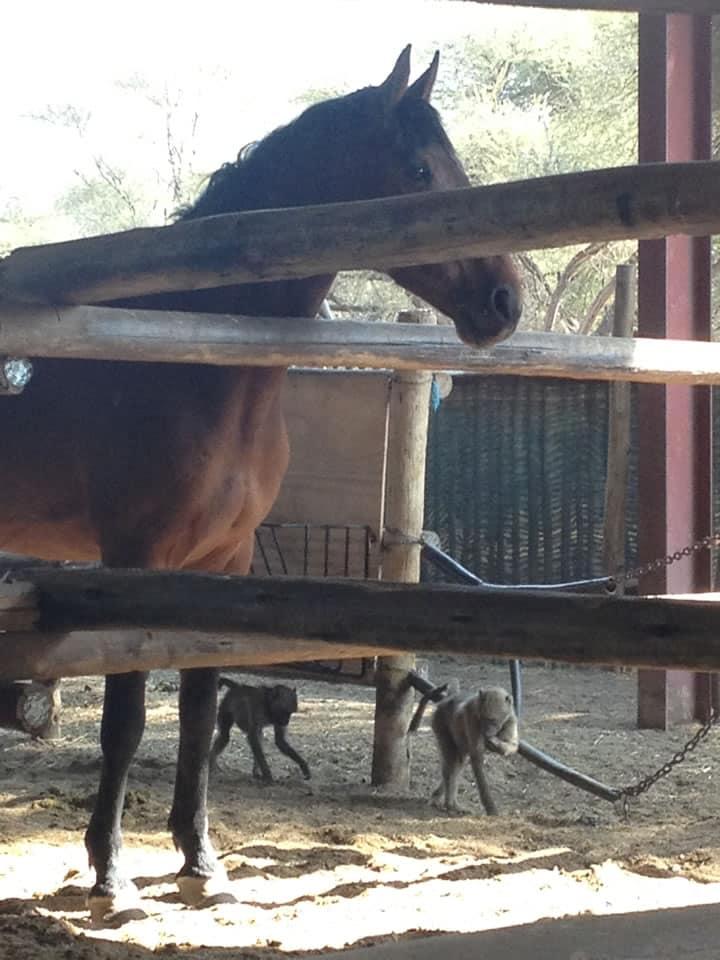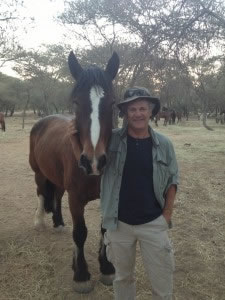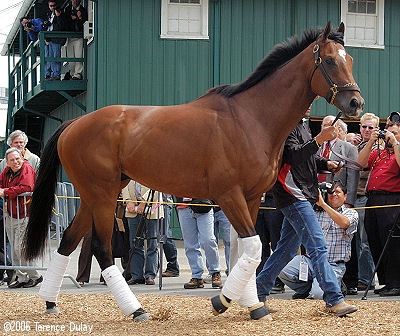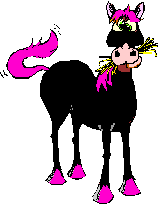Sometimes, you just get lucky. I had the opportunity to go to Africa in August. A set of fortuitous circumstances allowed me to have the opportunity to go look after the horses at Limpopo Horse Safaris, in Botswana, on the edge of the Limpopo River, just across the border from South Africa.
It was the trip of a lifetime. Here’s some things that I learned.
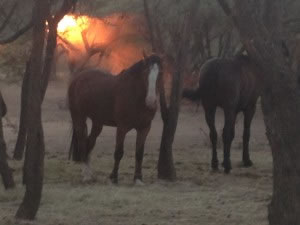 NO MATTER WHICH SIDE OF THE PLANET YOU’RE ON, HORSES DO JUST GREAT AS LONG AS THEY GET WHAT THEY NEED: I had heard that safari/tour horses are sometimes not the best kept horses. You know, I’d heard that they’re ridden into the ground, not well cared for, etc. I don’t know about other places, but it was certainly not the case at LHS. The care that the horses received is about as close to what I would consider ideal care as I have ever seen: frequent (but not obsessive) grooming, lots of turn out space, regular work, plenty of rest after hard work, and plenty of good food. Some pellets in the morning, grass hay for most of the day, and a bit of lucerne (alfalfa, by another name) in the evening. The horses get shod in front when they need it, but not in back. They run as a group, they work as a group, and they’re allowed to be horses. Lucky horses, for sure.
NO MATTER WHICH SIDE OF THE PLANET YOU’RE ON, HORSES DO JUST GREAT AS LONG AS THEY GET WHAT THEY NEED: I had heard that safari/tour horses are sometimes not the best kept horses. You know, I’d heard that they’re ridden into the ground, not well cared for, etc. I don’t know about other places, but it was certainly not the case at LHS. The care that the horses received is about as close to what I would consider ideal care as I have ever seen: frequent (but not obsessive) grooming, lots of turn out space, regular work, plenty of rest after hard work, and plenty of good food. Some pellets in the morning, grass hay for most of the day, and a bit of lucerne (alfalfa, by another name) in the evening. The horses get shod in front when they need it, but not in back. They run as a group, they work as a group, and they’re allowed to be horses. Lucky horses, for sure.
These working horses are very well-mannered, and very well-trained (there are some younger ones there that are on their way to getting well-mannered and well-trained, but the public doesn’t get to ride those). The horses know their job, and they know it well. But they are no deadheads – they don’t just stick their nose into a tail in front of them and refuse to move from there. No, these horses are really fun to ride and really fun to work around.
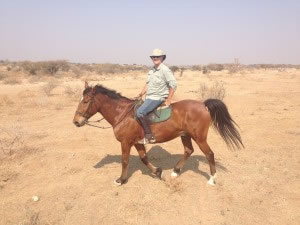 IT’S GREAT TO BE A HORSE IN AFRICA, EXCEPT FOR THE AFRICAN HORSE SICKNESS THING: Health issues seemed pretty much the same as with horses in the US, with the exception of the concern about African Horse Sickness. If you don’t know about African Horse Sickness, it’s a nasty disease that, happily, doesn’t occur in most of the world. There’s a vaccine against AHS that has some effectiveness (and the horses at LHS get it), but the vaccine does not guarantee ironclad prevention (you can read about AHS if you CLICK HERE). I didn’t have to treat a horse with AHS – I hope I never have to – but other than that, they were just horses, getting cut, bitten, and scraped up from time to time. I think that’s how it is in horse heaven.
IT’S GREAT TO BE A HORSE IN AFRICA, EXCEPT FOR THE AFRICAN HORSE SICKNESS THING: Health issues seemed pretty much the same as with horses in the US, with the exception of the concern about African Horse Sickness. If you don’t know about African Horse Sickness, it’s a nasty disease that, happily, doesn’t occur in most of the world. There’s a vaccine against AHS that has some effectiveness (and the horses at LHS get it), but the vaccine does not guarantee ironclad prevention (you can read about AHS if you CLICK HERE). I didn’t have to treat a horse with AHS – I hope I never have to – but other than that, they were just horses, getting cut, bitten, and scraped up from time to time. I think that’s how it is in horse heaven.
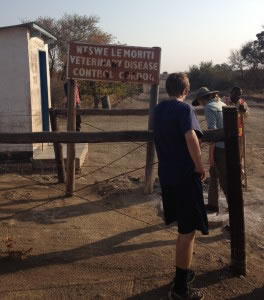 GOOD MEDICINE IS THE SAME, NO MATTER WHAT YOUR HEMISPHERES No real surprises in the horse medicine world in Botswana. Good medicine is effective, no matter where it’s given.
GOOD MEDICINE IS THE SAME, NO MATTER WHAT YOUR HEMISPHERES No real surprises in the horse medicine world in Botswana. Good medicine is effective, no matter where it’s given.
No “traditional” medicines were in sight, and especially not those that use animals or animal parts. In fact, care and respect for the animals was featured everywhere – just as we drove into Botswana, we saw a sign that said “No animals = no jobs.” Tourism helps everyone in Botswana, including the animals. EVERYONE knew about the slaughter of the rhinoceros for their horns, which, when ground up, is supposed to cure cancer and other ailments.
BY THE WAY: The US just barred the sale and trade of white rhino horns. CLICK HERE to read about it.
BY THE WAY (2): Why in the world won’t the rest of the world do the same thing? CLICK HERE if you want to read a depressing article about the world’s illegal wildlife trade.
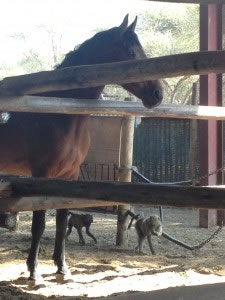 IF THERE ARE BABOONS IN THE BARN, IT MUST BE FEEDING TIME: I feel like I can safely say that you’ve probably never had baboons in your barn (baboons, not people acting like baboons). Around 6:30 am, when the horses are brought in to eat, at least 50 baboons of all sizes – big, strong males, curious, active youngsters, and babies hanging onto mom for dear life – descend on the compound, looking for horse pellets, water, and general trouble. Happily, after a few years of baboon thundering across the metal roof of the barn, there does seem to be a certain detente that has been reached between horse, human, and baboon. The baboons get to steal some horse pellets, they stay clear of people, they don’t bother the horses, and the horses really don’t seem to mind.
IF THERE ARE BABOONS IN THE BARN, IT MUST BE FEEDING TIME: I feel like I can safely say that you’ve probably never had baboons in your barn (baboons, not people acting like baboons). Around 6:30 am, when the horses are brought in to eat, at least 50 baboons of all sizes – big, strong males, curious, active youngsters, and babies hanging onto mom for dear life – descend on the compound, looking for horse pellets, water, and general trouble. Happily, after a few years of baboon thundering across the metal roof of the barn, there does seem to be a certain detente that has been reached between horse, human, and baboon. The baboons get to steal some horse pellets, they stay clear of people, they don’t bother the horses, and the horses really don’t seem to mind.
There is a dressage court on the property, but, as the title notes, sometimes you have to pick up the letters because the baboons knock them down. I mentioned that this also a problem back in the US, and then was forced to fess up that I was kidding when some folks took me seriously. Still, whatever the trials and tribulations of the place you ride may be, my guess is that coping with baboons is probably not part of your routine day.
I wouldn’t have missed it for anything.
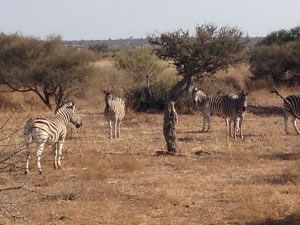 SOME HORSES BELONG TO THE WILD: There were lots of zebras around in the bush – Plains zebras (there are three kinds). Interesting animals – CLICK HERE to read about them. I’ve had the opportunity to work around a few zebras, in zoos, and at a circus once, and they are tough, dangerous animals. But as part of the African landscape, they’re more wary, and not at all threatening.
SOME HORSES BELONG TO THE WILD: There were lots of zebras around in the bush – Plains zebras (there are three kinds). Interesting animals – CLICK HERE to read about them. I’ve had the opportunity to work around a few zebras, in zoos, and at a circus once, and they are tough, dangerous animals. But as part of the African landscape, they’re more wary, and not at all threatening.
Nobody knows why they are called zebra, by the way – the origins of the word are obscure, dating back to the 1600’s. That said, I rather loved the Setswana (Setswana is the language of Botswana) word for zebra, which is pitsyeyanaga. The Setswana word for horse is pitsye. Ya is possessive, meaning “belonging to.” Naga refers to the wild. So, in Setswana, a zebra is, “A horse that belongs to the wild.”
Zebras have never been effectively made into domestic animals. In every other culture that had equids, they became companion animals, animals of work, and animals of transportation. But not zebras. If zebras could have been domesticated, they would have been domesticated. They are truly horses that belong to the wild. That’s the way it should be.
I REALLY, REALLY LOVE HORSES: I have to say that one of the most exhilarating parts of the trip was how it rekindled my love for horses. Most of my riding – before I became a veterinarian – was done in the foothills and mountains of Colorado. I’ve ridden across rivers, through herds of elk, and above tree line. I know that riding in such incredible settings helped fuel my love for horses, and it was a huge part of my motivation for becoming a veterinarian.
Cantering through the African bush gave me a feeling of freedom and excitement that I hadn’t felt in decades. I mean, it’s all well and good to go for a good canter anywhere, but when you’re in the wide open spaces, there’s a sense of losing all of your cares. When you look over and see a herd of wildebeest running alongside you, it adds a sense of wonder, about life, about your place in the world, about all that is (and isn’t) important. Riding every day was wonderful – I loved the freedom, the feeling of working with my horse to move through the bush (avoiding, for example, acacia bushes, which are the botanical equivalent of a porcupine), all the while looking for zebra, and elephant, and guinea fowl, and kudu, and impala, and giraffe… It was a complete and thorough intoxication with life, the horse, the people, and the land.
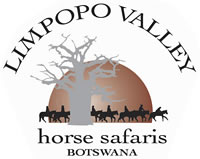 Finally, last, but not least, a plug for Limpopo Valley Horse Safaris. They ride in the Mashatu Game Reserve, across the South African border, in Botswana. They ride on 3, 4, and 7 day trips. The horses are wonderfully cared for, wonderfully trained, and an absolute pleasure to ride and work around. The people are fantastic: hard working, friendly, and informative. If you’re interested, email Louise Carelsen at [email protected]. Please let her know that I referred you.
Finally, last, but not least, a plug for Limpopo Valley Horse Safaris. They ride in the Mashatu Game Reserve, across the South African border, in Botswana. They ride on 3, 4, and 7 day trips. The horses are wonderfully cared for, wonderfully trained, and an absolute pleasure to ride and work around. The people are fantastic: hard working, friendly, and informative. If you’re interested, email Louise Carelsen at [email protected]. Please let her know that I referred you.
I fell in love with Botswana. If you ever want to go to Africa to ride horses, see wild animals, and have the adventure of your lifetime, you couldn’t pick a better place to do it.
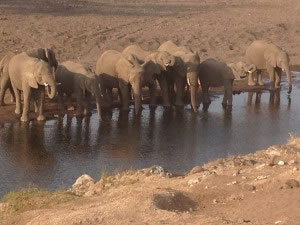 I hope I get to go again to watch the elephants take another drink.
I hope I get to go again to watch the elephants take another drink.

